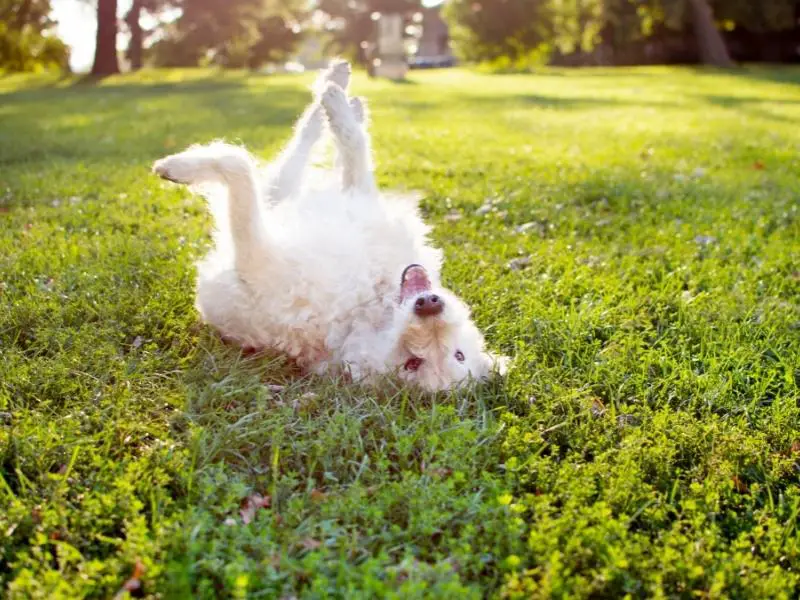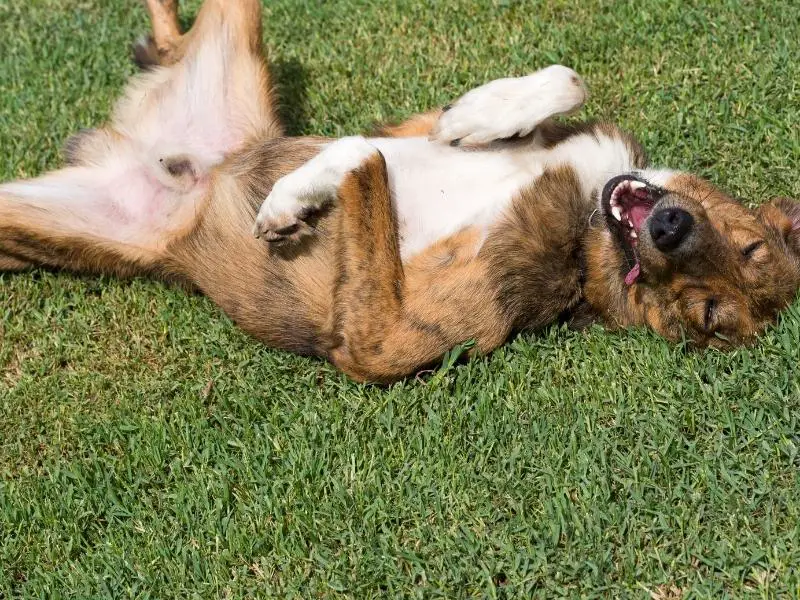Dogs have many bizarre behaviors, from chasing their tails, eating shoes, and rolling in stinky things. From carrion to feces, some pups enjoy covering themselves in the pungent odors that will leave their owners gasping for fresh air.
But why do dogs roll in poop? There are several theories why dogs roll in feces. By rolling in another dog’s poop, your dog may be trying to mark its territory. Another possibility is that rolling in poop is instinctual behavior passed on from wild dogs who rolled in feces to hide their smell from prey or predators.
Rolling in poop and other stinky things is a common behavior for dogs. But while your pooch might not have any issue with being covered in poop, you certainly find this behavior problematic.
Read on to find out why dogs roll in poop and how to teach your dog to stop.
Reasons Why Dogs Roll in Poop
It seems impossible that anyone would willingly cover itself in another’s poop. Still, your dog has done it one too many times.
This bizarre behavior has left even the most experienced behavioral experts scratching their heads. There is no definitive answer, but there are several theories why dogs roll in the poop, including:
Communication
Rolling in feces might be a form of communication among the pack. In this case, your dog’s pack is you. When your dog returns to its pack, it’s bringing back the smells of all the places it has been.
After sniffing the dog, other pack members can retrace its steps by following the scent back to its source and any food found close by. So, by rolling around in feces or other smelly things, your dog might be trying to communicate about that great thing it has found.
Scent Marking
A dog may roll in another dog’s poop to leave its own scent behind. This type of behavior is similar to marking, which is a common canine behavior.
You’ve probably caught your dog urinating on many things, especially right after another dog has urinated at the exact same spot. This type of behavior is known as territorial marking, and it’s your dog’s way of communicating to other dogs and animals that are in its area.
Your dog rolling in poop may be trying to cancel another dog’s scent. Or it may intentionally try to leave its scent instead.
Camouflage
The ancestors of domestic dogs didn’t have full bowls of kibble waiting for them at home. Unlike your pooch, wild dogs and wolfs had to hunt to survive.
Rolling in their prey’s poop or smell allowed wolves to hide their own scent and advance toward their prey without scaring it away.
While your dog doesn’t have to hunt for dinner, it may follow an instinct that has been passed down through many generations.
Boredom
Dogs turn to destructive behaviors when they are understimulated or bored. A bored dog will chew, dig, and howl, so it’s safe to assume that rolling in poop might be a sign your dog needs more attention and mental stimulation.
Health Risks of Dog Poop

Dog poop is full of harmful bacteria and parasites that are dangerous for dogs and people. Gastrointestinal parasites like roundworms, hookworms, and whipworms shed eggs in dog poop.
People and dogs that come into contact with contaminated poop can get an infection. Cryptosporidium and giardia are other protozoal parasites commonly found in dog feces.
These tiny parasites are easily transferred from dogs to people leading to diarrhea, vomiting, weight loss, anemia, dull-looking coat, and lethargy. Sometimes, dogs and people can be asymptomatic but actively transmit pathogens, infecting other dogs and people.
When not diagnosed and treated in time, these parasites can migrate to surrounding tissues causing lung, eye, and skin problems.
Besides parasites, dog poop can also be home to bacteria, including Salmonella, E.coli, and Campylobacter. These bacteria can be wound even in the feces of healthy dogs.
A dog that rolls in dog poop regularly is at a high risk of contracting any of these parasites if it’s not on a topical or oral parasite preventative treatment.
Keep your dog on parasite preventative treatment and scoop its poop, to prevent these parasites from spreading. To lower the risk of contamination, you’ll also need to teach your dog to stop rolling in feces.
How to Get Your Dog to Stop Rolling in Poop
Most pet parents aren’t actually interested in why dogs roll in feces but would do anything to learn how to stop it.
Rolling in poop is an instinctual behavior, and you probably won’t be able to repress your dog’s instinct. The best thing you can do is limit your dog’s opportunities to roll in poop.
Keep Your Dog Leashed
If your dog is on-leash, it’s much easier to simply walk away from the problematic area. This way, your dog will never get the chance to roll in poop in the first place.
However, if your dog is off-leash, it’s much harder to keep it away from the offending areas.
Teach Your Dog to “Leave It”
Many behavioral experts recommend teaching a dog the command “leave it” or “come.” Once your dog learns these commands, you can simply say “leave it” every time you come across poop or other stinky things.
Observe Your Dog’s Behavior
Most dogs exhibit specific behaviors just before they dive into the pile of feces. For example, you may notice that your pooch is sniffing intensely in one area, then shaking its head, or twisting its face to one side before rolling in poop.
When you notice that your dog is sniffing intensely it’s a perfect time to issue the “leave it” command.
Conclusion
Rolling in poop is normal behavior for dogs, but it may make you question your reasons for getting a dog in the first place. Hiding their own scent, marking territory, communication, and boredom are the most common reasons why dogs roll in poop.
Regardless of the reason, your best bet to stopping this behavior is to don’t give your dog an opportunity to do it.
Related Articles:


0 Comments